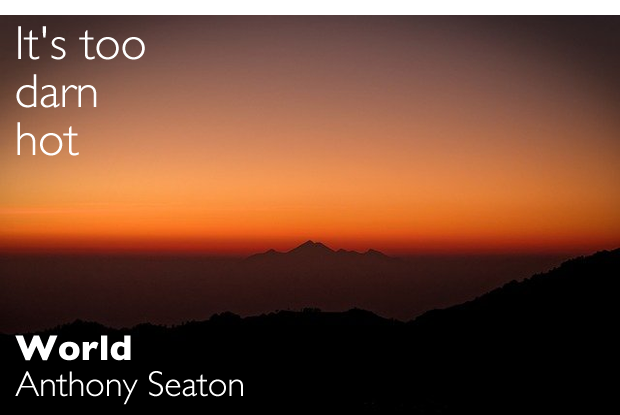
The young optician examining my eyes spoke with a slight Spanish accent. I asked him where he came from and he told me that he was from Seville but now lived in Edinburgh, explaining that it was just too hot to live in southern Spain. A gain for Scotland and a loss for Spain â he was very competent and had a manner of explaining the issues that would put some of my own colleagues to shame. Another reminder of the folly of Brexit and the unlamented Johnson. The Cole Porter song came to me, and an image of a sweating Ella Fitzgerald singing â ‘it’s too darn hot’.
As I write, we are going through an unusual heatwave. Another European tale, from about 15 years ago during another heatwave. I was speaking to a Greek friend, a chest physician from Athens, and mentioned the current problems they were having with illness and deaths provoked by air pollution. He told me that most were apparently caused not by pollution but by heat stroke in people who had no means of keeping cool.
Going further back, in the 1990s I chaired a UK Government committee charged with advising on air quality standards. Those of us who remembered the gross pollution of the 1950s found it a bit difficult to understand how current pollution in UK (less than a milligram of carbon particles inhaled per 24 hours) could possibly cause heart attacks, and some argued that the issue was really temperature change, both very hot and very cold temperatures being associated with increases in deaths across populations.
Eventually it became apparent that both pollution and temperature played a part, and we were able to come up with a plausible explanation of the effects of low dose air pollution that is now generally accepted. But heat remains a killer, almost exclusively of the elderly with heart and lung disease but occasionally of babies. It has now been shown that, while cold weather is also associated with increased death rates, for every degree Celsius above 19â°C, the death rate among the elderly rises by between 3% and 4%. As we have also seen, hot weather tempts the unwary into cold water and drownings occur among the young.
The warming effects of the Earth’s atmosphere, retaining some of the heat from the sun, enabled life to develop and we have all adapted to the conditions in which we live, be we Inuit or native Australian or anyone living between these two climatic extremes. Since observations by Fourier and Tyndall in the 19th century, it has been known that the atmosphere has the capacity to retain heat. That it was warming progressively was first pointed out by a Swedish scientist, Svente Arrhenius in 1896.
In 1938 an English engineer, Guy Callender, suggested that the oceans were likely to fail in their role of absorbing all the CO2 we were producing, and that progressive temperature rise would be expected. The rise in greenhouse gases, mainly CO2 and NO2 from combustion and methane from farming and extractive industries, is firmly established as the primary cause of climate change. It is now close to reaching a tipping point which threatens the survival of civilisation.
Civil society depends on an even temperature and a supply of food, water and energy. All are now being disrupted worldwide. Failure of any one of these leads inevitably to migration, from drought, flooding, crop failure, starvation and civil unrest. Arrhenius took the optimistic view that rising temperatures would enhance the agricultural productivity of northern climes and he was probably right up to a point. Putin will know this, and with Russian grain, oil and gas, climate change is on his side; they make a formidable opponent which politicians would do well to understand.
It is now time to change our behaviour radically. We all know what to do and it demands sacrifices. Within very few years there will be no more buying petrol or diesel, no more foreign travel by air, much less meat-eating, cooler well-insulated homes, and the development of personal circular economies. We cannot afford to leave this until tomorrow or to hope everyone else will do it; it is the responsibility of each one of us to change our lifestyles accordingly. Putin’s war has brought this into sharp focus, and he will be the winner ultimately if we and our politicians do not grasp the opportunity that he has forced upon us, of managing to shift to a carbon-free economy without his, or indeed our own, fossil fuels.
Humans run on a temperature of around 37.5â°C and we cannot survive for long if the ambient temperature is consistently greater than this. We cannot survive without rain, nor obviously can we live underwater or in space, whatever billionaires speculate. Think of Australia, where will people there go when the temperature rises further? Or Bangladesh, as the ocean covers most of its agricultural land? Or all those Pacific islands? Were it not for Brexit, Scotland would now be in a position to welcome many more bright young southern Europeans who wish to work and live in our currently mild climate. Migration is inevitable and will increase; we cannot afford to waste the talents of the displaced and must learn to take advantage of it.
With James Watt and Adam Smith, we started climate change and its effects on our climate, and food costs are already becoming apparent; we must lead the way to slowing it down and keeping the hope alive of saving civilisation, before it really gets too darn hot to manage.
Footnote: Professor Seaton’s book, Farewell King Coal, Dunedin Press, explains these issues in more detail.